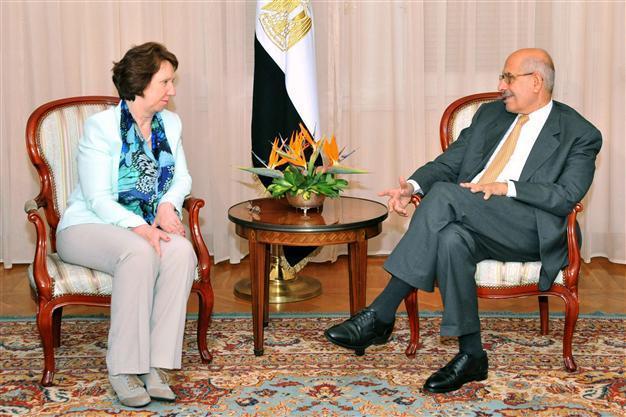EU's foreign policy chief regrets not seeing Morsi, urges release in Egypt trip
CAIRO - Agence France-Presse

In this handout picture made available by the Egyptian Presidency on July 17, Egyptian Vice President for Foreign Relations Mohamed ElBaradei meets with EU foreign policy chief Catherine Ashton in Cairo. Ashton held a series of meetings with Egypt's new leaders, including interim President Adly Mansour and army chief Abdel Fattah al-Sisi who toppled elected President Mohamed Morsi. AFP photo
EU foreign policy chief Catherine Ashton said July 17 that she regretted not having been able to meet Egypt's ousted President Mohamed Morsi on a visit to Cairo.She called for his immediate release from the custody he has been kept in since just hours after the military toppled him on July 3 following nationwide street protests against him.
"I believe he should be released. I was assured he is well. I would have liked to see him," Ashton told reporters.
During her visit, Ashton met the country's new leaders, including interim President Adly Mansour, prime minister Hazem al-Beblawi and the general behind the coup, army chief Abdel Fattah al-Sisi.
Talks with Brotherhood officials
She said she had been able to meet officials of the Freedom and Justice Party (FJP), the political wing of Morsi's Muslim Brotherhood, many of whose leaders have been detained.
She said she also met representatives of Tamarod, the grass-roots movement behind the mass protests that led up to Morsi's overthrow.
On a visit to Cairo on July 15 and July 16, U.S. Under Secretary of State William Burns did not meet Muslim Brotherhood representatives and was snubbed by Tamarod.
Senior FJP official Amr Darrag said it had been the EU who had sought the meeting.
"The delegation didn't come to ask the EU anything, the meeting took place at Ashton's request," he told the state MENA news agency. Ashton told Egypt's interim leaders that the EU wanted "a quick return to the democratic process, and a full, inclusive process," her spokesman Michael Mann told AFP.
She also stressed "the need to get the economy going as quickly as possible," in a country where a quarter of the population live below the poverty line.
On July 16, a new 34-member cabinet was sworn in, but both the Muslim Brotherhood and the main Salafist party Al-Nur spurned offers to join it.
As a result, none of the ministers in the caretaker administration are affiliated to the Islamist movements which swept Egypt's first freely contested parliamentary elections.
The top EU diplomat also reiterated European concerns about the unrest that has rocked Egypt since Morsi's ouster on July 3, in which more than 100 people have been killed, according to an AFP tally.
















